CLion 2020.1 EAP: CUDA Support & Clang on Windows
CLion started the 2020.1 EAP program last week with many improvements to Clang-based tooling, the debugger, and the overall editor. This week a new build is available, bringing more sophisticated CUDA support!
You can download the build (201.4865.10) from our website, via the Toolbox App, or as a snap package (for Ubuntu) and install it side by side with the stable release build.
CUDA support
Why CUDA?
Before jumping into a detailed overview of what’s actually supported for CUDA, let me first briefly elaborate on how we have come to this decision. If you are not really interested in this, feel free to skip directly to the next part.
CLion is a general-purpose cross-platform C and C++ IDE. There are plenty of interesting domains where C and C++ are used as the primary language. A number of global industries, like High-frequency trading (HFT), embedded development, and game development, use C and C++, along with other more specific fields like automated vehicle research, AI, telecommunications, and GPGPU. Because of the limited number of developers we have in the team, it’s hard to cover each and every one of these areas right now. (Believe us, we’d love too!) So we have had to make some difficult choices about what to prioritize.
That’s why we recently analyzed the current state of CLion’s support for various C++ development areas. The main criterion we considered was whether users were able to expect their code to be correctly handled by the IDE, at least from the general C++ perspective. And once that was determined, more specific requests would come into play.
With this framework to guide us, in November 2019 we took a look at various areas where CLion was still weak and realized that CUDA was one where we generally failed to meet our criterion. Taking Qt as a point of contrast, CLion can successfully parse and work with a Qt project. Some Qt specifics might not be taken into account in the refactorings, code generation, and other smart actions, but from a C++ language perspective, they are still correct. With CUDA the situation was different. CUDA C and C++ is essentially C/C++ with a few extensions, and the IDE was not handling these extensions correctly. This resulted in red code, false positives, and other unpleasant consequences that you could encounter as soon as you started using CUDA in CLion, making the IDE completely impossible to use.
That’s why we’ve decided to dedicate some time to fixing these issues with CUDA. Of course, more specific support for specific technologies, be they CUDA, Qt, or others, is also on our roadmap for the future. But for now, our goal is to eliminate the most irritating issues.
Start a new project with CUDA
If you are new to CUDA, we recommend starting by downloading the CUDA Toolkit from the official site and checking out the official documentation. To start a new project in CLion, call File | New Project and select CUDA library or CUDA executable:
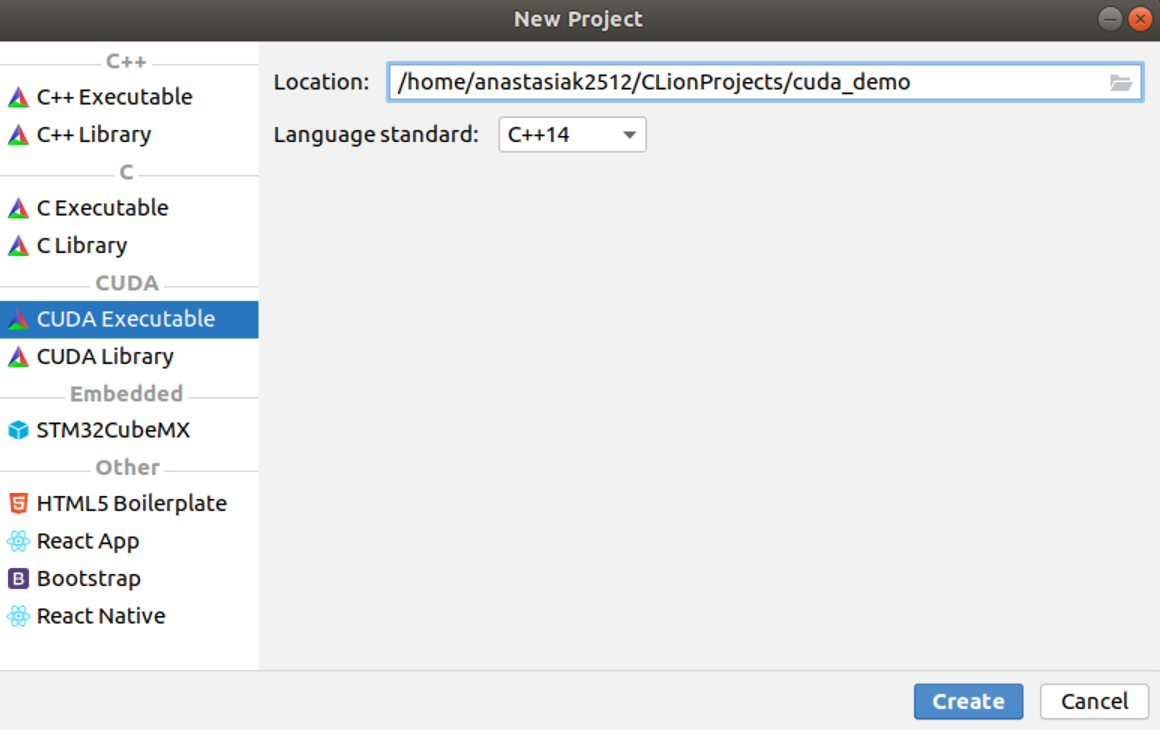
The sample CMake and main.cu files will be generated for you:
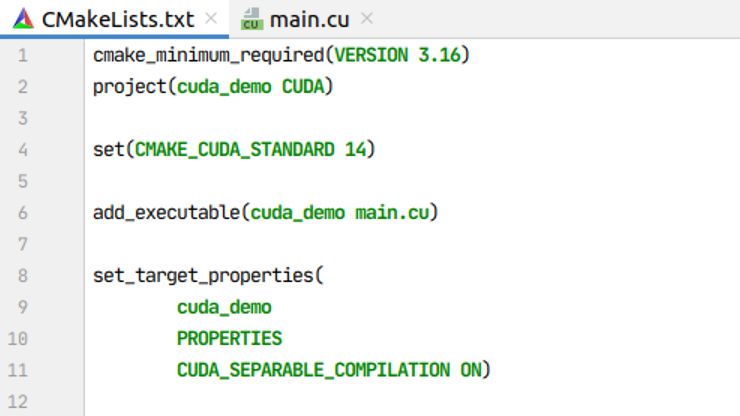
You may notice new file extensions for source and header CUDA files – .cu/.cuh. They are also available in the new C/C++ file creation dialog and have their own icons:
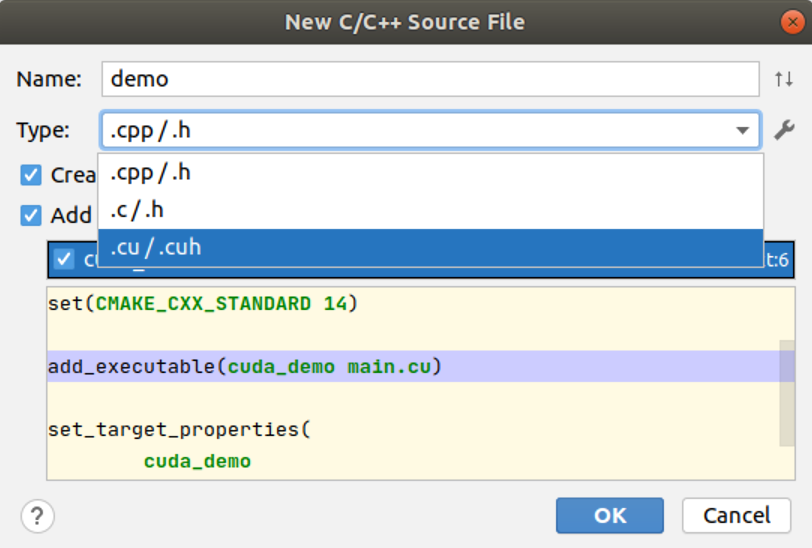
For CUDA projects, the list of CMake targets in this dialog includes general CMake and CUDA targets (created with cuda_add_executable/cuda_add_library).
How does CLion support CUDA?
Let’s clone the ClaraGenomicsAnalysis project from GitHub and check out what CLion is capable of in terms of CUDA support. Make sure CMake used in CLion knows where to find the CUDA toolchain. For example, you can set CMAKE_CUDA_COMPILER to the nvcc compiler path.
The first thing you’ll notice is that CUDA code, including all CUDA specific extensions, is now parsed and highlighted correctly:
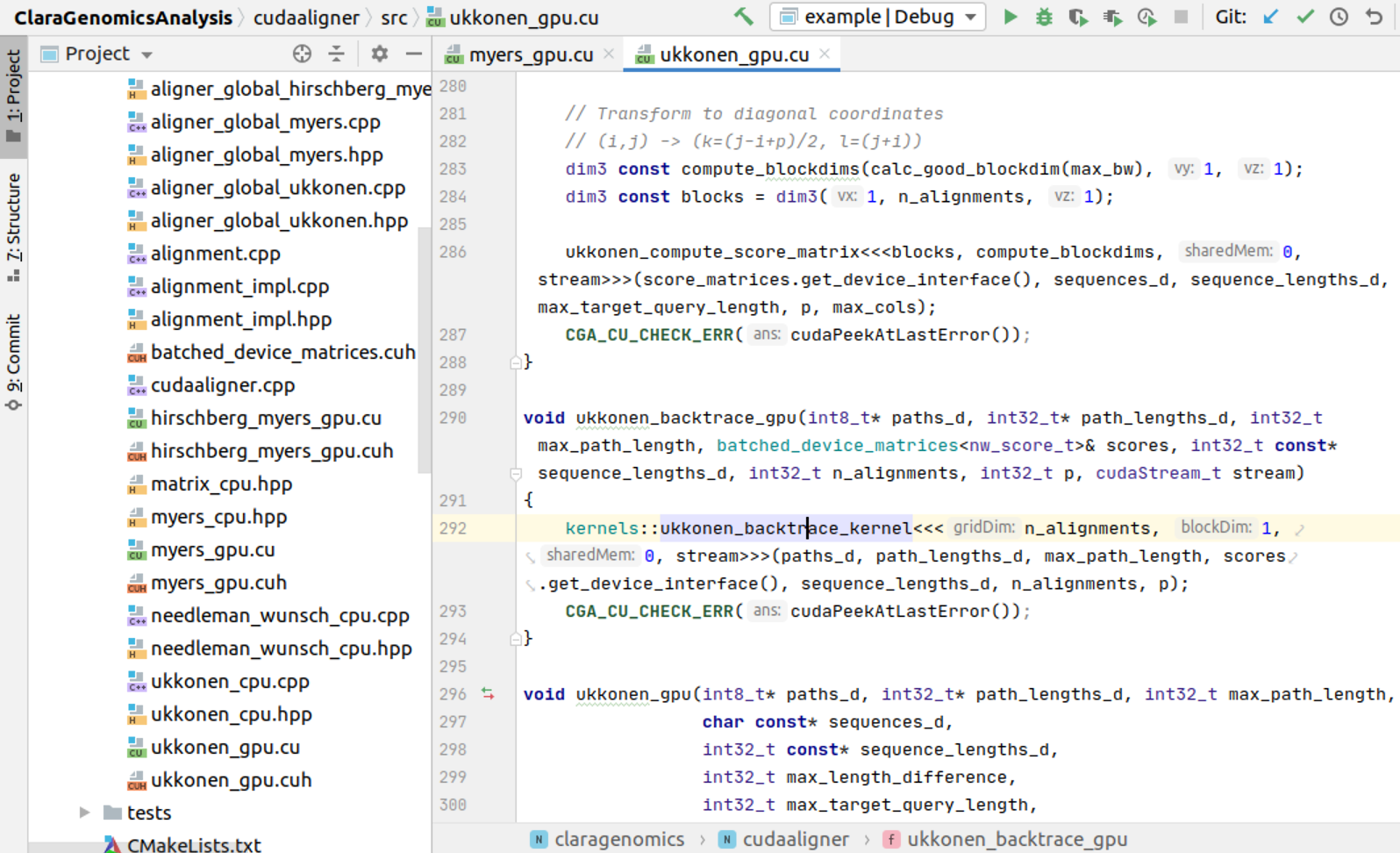
This means code navigation, code documentation, and other code assistance actions work:
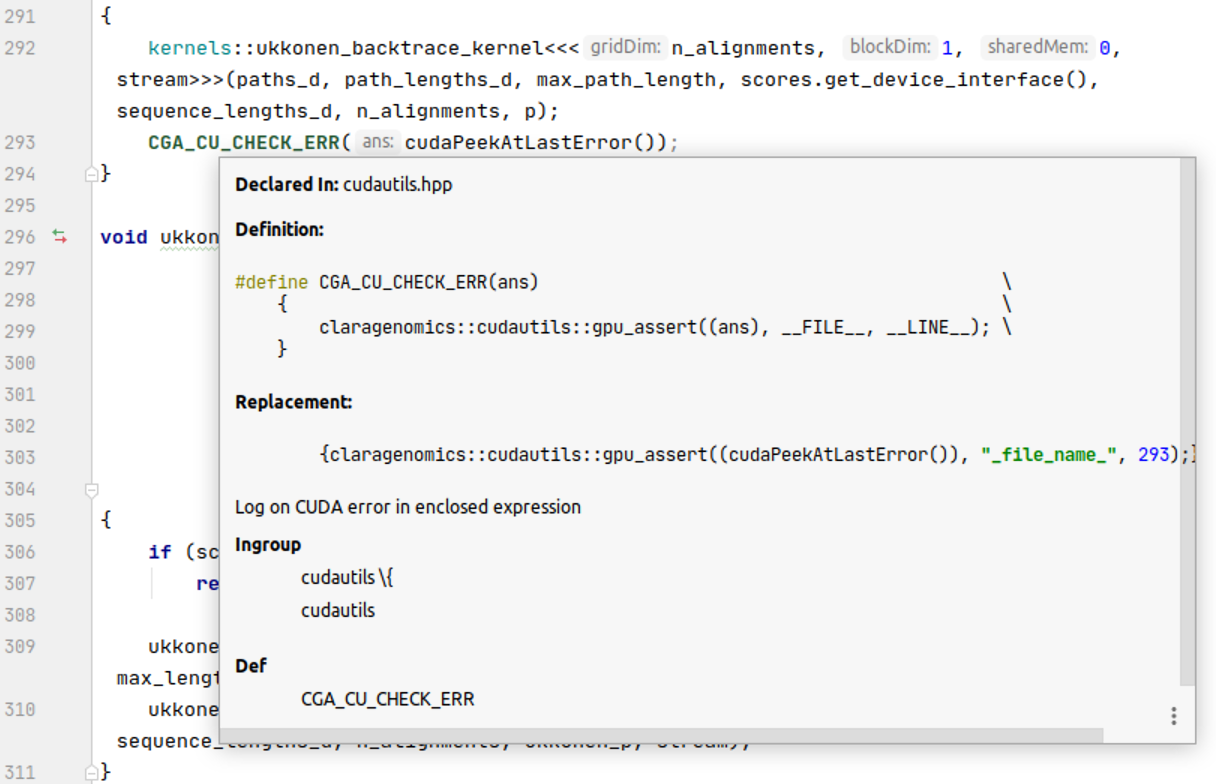
Additionally, CLion can complete angle brackets for kernel calls:
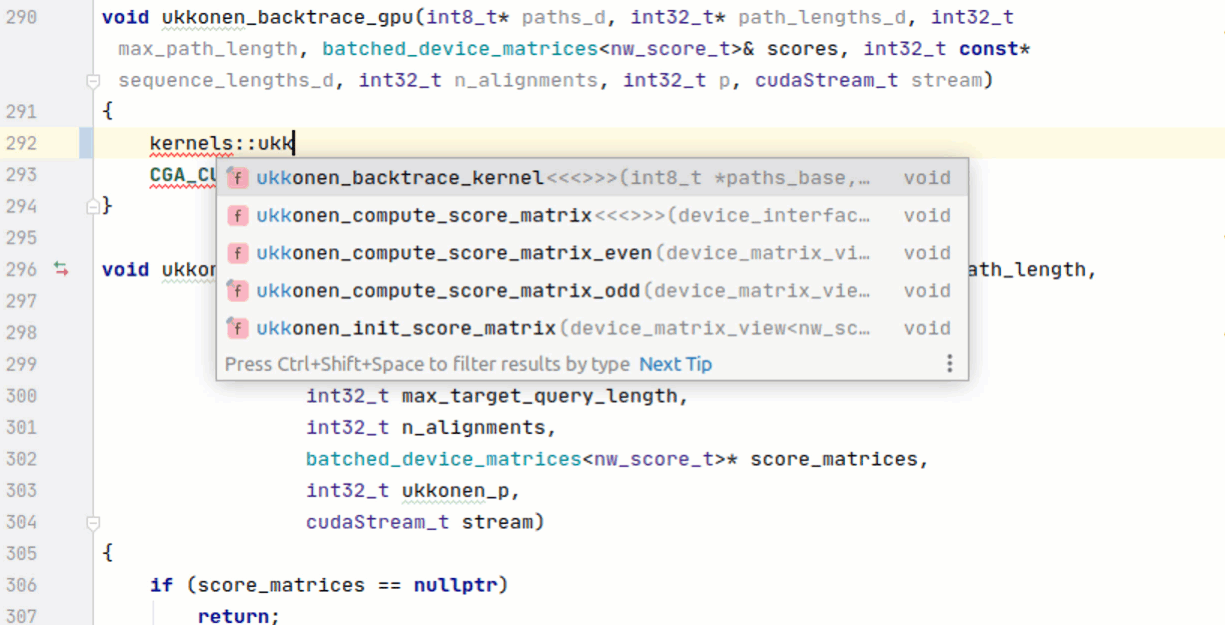
Known issues and limitations
First of all, there are some OS-specific details you’ll need to pay close attention to:
- On Windows: CUDA only works with the Microsoft Visual C++ toolchain, and you are required to have x64 cl.exe in your PATH. For this toolchain, CLion bundles the LLDB-based debugger developed by JetBrains, which for the moment might have issues with the CUDA code.
- On Linux: Because of the regression, cuda-gdb can’t be selected in the UI (CPP-18931).
- On macOS: We didn’t test on this platform, as it’s officially no longer supported after v10.13.
Other notable issues for CUDA code include:
- Code insight actions (like Go to Declaration, Rename, or Extract Variable) don’t work inside
<<<...>>>(CPP-18722). - Coverage, cuda-memcheck, Valgrind Memcheck, and Profiling don’t work properly for CUDA projects, for now at least. This is definitely a feature we are considering to address in future updates.
Clang on Windows
While Clang has been available in CLion on Linux and macOS for quite a long time, certain issues and limitations made it too inconvenient to be practical on Windows. We have now made it possible to use clang-cl in CLion on Windows! All versions from 8.0 on are supported.
You can install it from the LLVM site or along with the Visual Studio tools. When done, select the Visual Studio toolchain in CLion and point to clang-cl.exe in the toolchain settings:
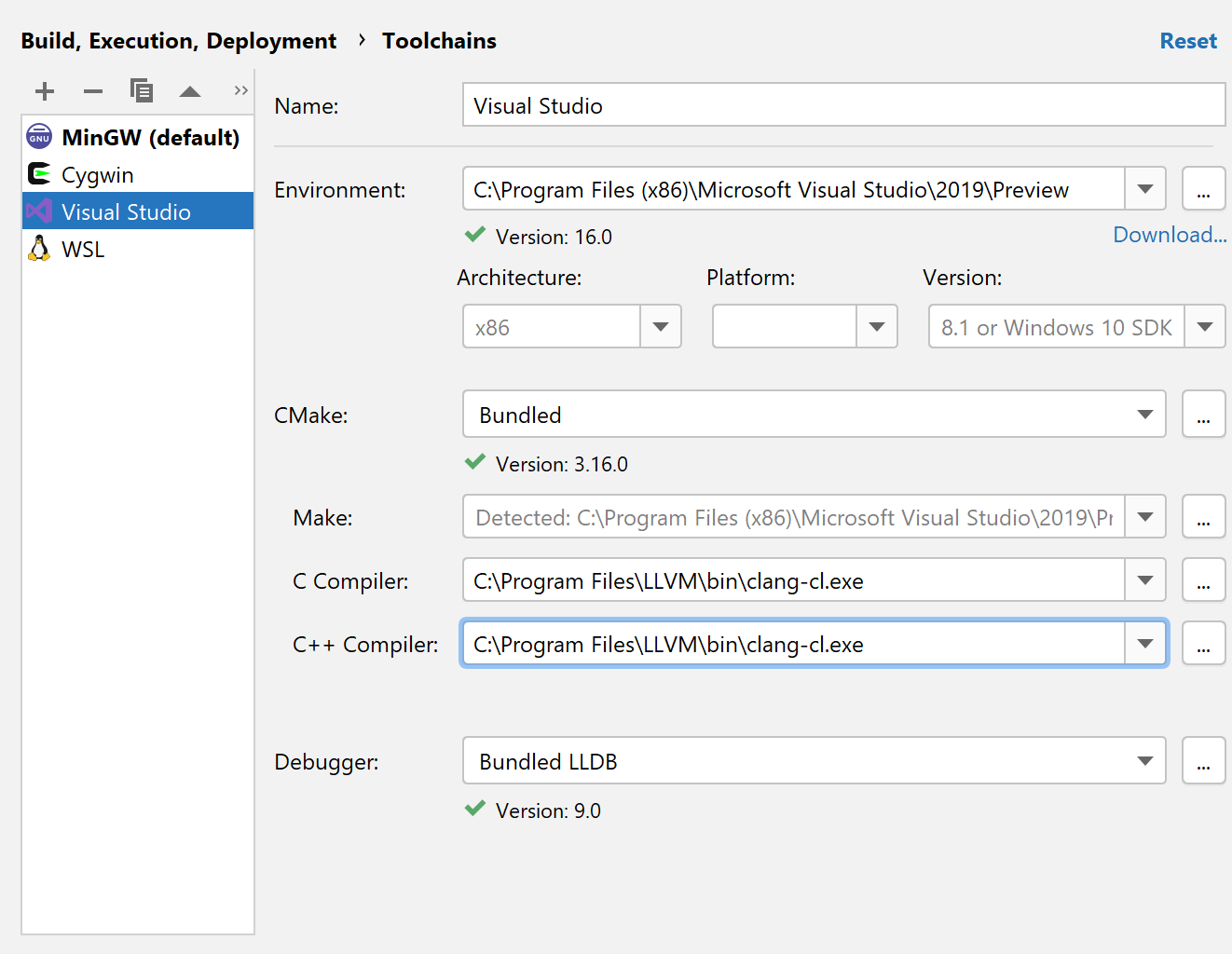
You are now all set up!
Mind you, there is a known issue that causes -T clangcl options not to be picked up by CLion if the bundled CMake is in use while Visual Studio is enabled (CPP-18848).
If you want to find out more, the full release notes are available here.
Your CLion team
JetBrains
The Drive to Develop
Subscribe to CLion Blog updates







